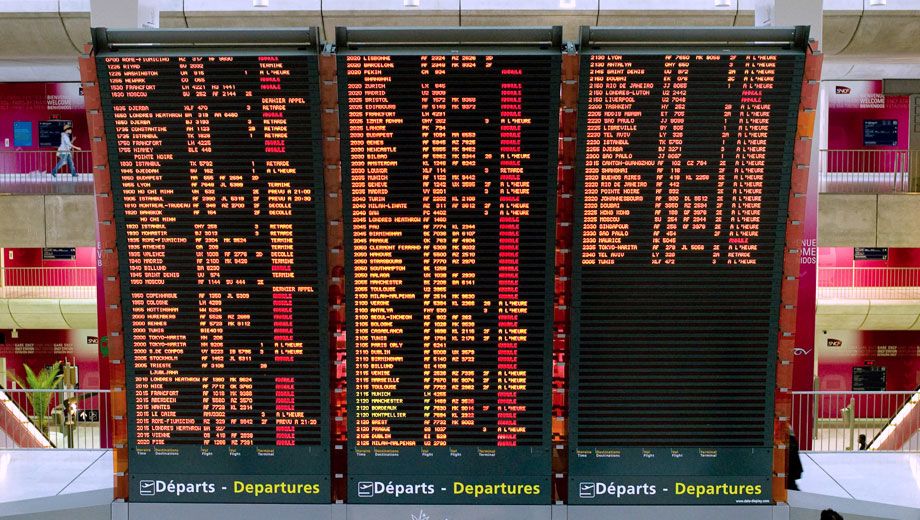Be prepared: frequent flyer tips to deal with travel cancellations and disruptions

Predictions of delayed flights, cancelled journeys and travel disruptions on the news -- or Australian Business Traveller's @AusBT twitter account?
There's any number of reasons for extensive or widespread journey problems, from weather (especially in stormy seasons) to a flight being just late enough for you to miss your connection, or a technical issue that takes your plane out of service.
We've put together our best advice for how to prepare and what to do if your travel plans are affected, especially if you know that things might go awry before you start.
Be prepared
If you know that delays are likely along your trip, make sure you have with you:
- the details of your travel insurance policy, and especially what it will and won't cover
- fully charged smartphone with Internet access -- and the charger
- a change of clothes and your washbag in your hand luggage
- a list of local hotels at each airport your trip involves
- a dictionary or language app (like Google Translate) if you'll be in an airport where English isn't the primary language
- portable food like muesli bars and water in case you're delayed without decent food options
For most trips under normal circumstances, you can skip some of these if you're feeling relatively confident and if your trip isn't ultra-time-critical.
Keep your airline's contact numbers handy
Make sure you have the direct dial for your elite tier frequent flyer status group as well. The Platinum queue is usually shorter than the main number's, so you have a better chance of getting through.
If you're travelling internationally, make sure you also have their international numbers, and know how much the phone call will cost.
In the UK, for example, certain numbers aren't included in your allocation of monthly minutes. 0800 freephone numbers actually cost money to ring from mobiles too -- more than a regular landline number!
Take the initiative to rebook your own flights
Some airlines' systems will automatically rebook you on a flight according to their own system algorithms. If you'd like a particular set of flights, then feel free to ring up the airline to try to change them.
Of course, your airline's contact centre is likely to be overwhelmed if the flight change is due to an ash cloud-sized problem.
So make sure you have your airline's app and flight schedule apps like Skyscanner and Kayak handy on your smartphone to scope out options.
And keep checking your itinerary online to make sure everything's still how it should be. We've known changes to revert or to be changed again without notification.
Consider picking up a fully flexible ticket immediately
Pick up a fully flexible ticket on the best flight to your destination if seats are likely to get scarce quickly. You'll at least have a seat on that plane whatever happens, and that's a position of strength when talking to the airline.
The angle to take is: "You're telling me there are seats on flight 101, but I have a fully flexible ticket on that flight, reservation number 123ABC. Please transfer me onto that flight and refund my fully flexible ticket."
You'll need to make sure you know what the cancellation policy is, though. Virgin Australia's rules for its flexible tickets, for example, include being able to cancel the flight even after the departure time if you miss it. Qantas' flexible tickets rules also allow flexibility.
But if the airline rebooks you and you then cancel the flexible ticket after the cancellation deadline, you might be out of pocket.
That said, even if the airline can't rebook you on that flight, your travel insurance may well cover the cost of the replacement flight -- and you can also claim the refund on the original ticket.
Know the schedule options
Use Google Flight search or apps like Skyscanner or Kayak to check the airline's schedule -- and their partners' -- so you know whether to accept that five hour stopover on the way to your destination.
You might also want to be aware of airlines' alliance partners in oneworld, Star Alliance and SkyTeam. If your Qantas flight from Sydney to London is delayed, they'll be happier to book you on a British Airways flight than Singapore Airlines or Emirates. Each of the alliances has its own iPhone appd.
Of course, if you're flying on a less-well-travelled route, there may be a reduced number of options. So if there's only one flight daily to your destination, you'll know to go kick your heels back with a glass of something until tomorrow instead of trying to change your flights.
Don't wait for the airline to sort you out with a hotel
If you're not going to be getting on a flight the same day, you and nearly 500 fellow passengers will be queueing up for the airline to sort you out a hotel if your A380 is delayed. That's probably a queue you'd rather not stand in.
Since your travel insurance will probably cover the hotel anyway, book yourself into a decent business class hotel (though we wouldn't recommend splurging unless there's nothing else left, unless you want your insurance to start asking pointed questions).
Of course, you'll want to make sure you know what your insurance covers.
A range of hotel apps for the most common international hotels, stashed away in a folder on your iPhone, is always a good idea for emergencies.
And if you're a Priority Pass lounge network member, keep the Priority Pass loungefinder app around in case you need to find a lounge for a shower and a chance to recharge.
Your top tips
What's your favourite tip when flight problems are forecast? Share it with our readers in a comment below, or join the conversation on Twitter: @AusBT.
Hi Guest, join in the discussion on Be prepared: frequent flyer tips to deal with travel cancellations and disruptions